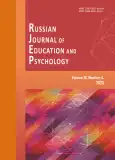Диагностика профессиональной готовности педагогов к выявлению и развитию одаренности у дошкольников
- Авторы: Ховякова А.Л.1
-
Учреждения:
- Сочинский государственный университет
- Выпуск: Том 16, № 4 (2025)
- Страницы: 247-265
- Раздел: Педагогические исследования
- Статья опубликована: 30.09.2025
- URL: https://bakhtiniada.ru/2658-4034/article/view/348997
- DOI: https://doi.org/10.12731/2658-4034-2025-16-4-902
- EDN: https://elibrary.ru/LKLILU
- ID: 348997
Цитировать
Полный текст
Аннотация
Обоснование. В настоящее время актуальными направлениями педагогической работы становятся различные аспекты выявления и развития детской одаренности. Вместе с тем, недостаточно разработанными являются вопросы технологии оценивания профессиональной готовности педагогов. Автор выделяет критерии профессиональной готовности педагогов к выявлению и развитию одаренных дошкольников на основе анализа Профессионального стандарта «Педагог (педагогическая деятельность в сфере дошкольного, начального общего, основного общего, среднего общего образования) (воспитатель, учитель)» и преобразования трудовых действий, необходимых знаний и умений. С использованием выявленных критериев осуществляет исследование и анализ затруднений, возникающих у педагогов дошкольных организаций города Сочи.
Цель – теоретическое обоснование критериев профессиональной готовности педагогов к выявлению и развитию одаренных дошкольников, эмпирическое изучение на основе выделенных критериев затруднений, возникающих у педагогов дошкольных организаций.
Материалы и методы. Главные теоретические методы исследования – анализ и аналогия. Трудовые действия, необходимые знания и умения, указанные в трудовой функции «Педагогическая деятельность по реализации программ дошкольного образования» Профессионального стандарта педагога, анализировались и использовались как элементы, преобразуемые посредством аналогии в критерии профессиональной готовности педагогов к выявлению и развитию одаренных дошкольников. Также в статье используется эмпирический метод анкетирования, позволяющий исследовать и проанализировать затруднения, возникающие у педагогов дошкольных организаций города Сочи в работе с одаренными детьми.
Результаты. На основе анализа и преобразования трудовых действий, знаний и умений, содержащихся в Профессиональном стандарте «Педагог (педагогическая деятельность в сфере дошкольного, начального общего, основного общего, среднего общего образования) (воспитатель, учитель)», было осуществлено теоретическое обоснование критериев профессиональной готовности педагогов к работе с одаренными дошкольниками. Критерии, представленные в виде диад знаний и умений, использовались для формулировки затруднений и составления опросника для педагогов. Эмпирическое изучение затруднений, возникающих у педагогов дошкольных организаций, позволило выявить наиболее и наименее часто встречающиеся затруднения, что позволяет сделать вывод о возможности использования опросника для адаптации содержания программ подготовки или повышения квалификации к образовательным потребностям конкретной аудитории слушателей.
Ключевые слова
Об авторах
Анна Леонидовна Ховякова
Сочинский государственный университет
Автор, ответственный за переписку.
Email: Khovyakova@yandex.ru
ORCID iD: 0000-0001-7945-0458
SPIN-код: 3508-5581
Scopus Author ID: 57193229318
ResearcherId: ААО-9472-2020
кандидат педагогических наук, доцент кафедры педагогического и психолого-педагогического образования
Россия, ул. Пластунская, 94, г. Сочи, 354003, Российская Федерация
Список литературы
- Абросимова, Е. Б., Макарова, Е. А., & Макарова, Е. Л. (2024). Психологическая диагностика и психолого-педагогическое сопровождение одаренных детей в обучении музыке. Russian Journal of Education and Psychology, 15(3), 308–328. https://doi.org/10.12731/2658-4034-2024-15-3-515. EDN: https://elibrary.ru/BYHYSE
- Губайдуллин, М. И., Валиева, З. Х., & Исангулова, Р. Г. (2017). Педагогическая диагностика способности к работе с одаренными детьми и подростками. Вестник Академии детско-юношеского туризма и краеведения, (4)(125), 78–79. EDN: https://elibrary.ru/ADBFMP
- Долгова, В. В. (2016). Векторы подготовки учителей к работе с одарёнными детьми. Современные тенденции развития науки и технологий, (3-11), 53–56. EDN: https://elibrary.ru/VTPXAV
- Дудырева, Н. В. (2013). Психологическая готовность учителя к работе с одаренными обучающимися: автореф. дис. … канд. психол. наук. Ярославль, 24 с. EDN: https://elibrary.ru/SVHDGJ
- Золоторева, А. В. (2016). Состояние и проблемы подготовки педагогов к работе с одарёнными детьми. Ярославский педагогический вестник, (4), 20–25. EDN: https://elibrary.ru/WZJZOJ
- Насакова, Б. Ж. (2011). Профессиональная подготовка учителя для работы с одарёнными детьми. Вестник Бурятского Государственного Университета, (1), 199–201. EDN: https://elibrary.ru/NELXGH
- Профессиональный стандарт «Педагог (педагогическая деятельность в сфере дошкольного, начального общего, основного общего, среднего общего образования) (воспитатель, учитель)» [Электронный ресурс]. В Правовая система «КонсультантПлюс». https://www.consultant.ru/document/cons_doc_LAW_155553/fcd5ad2f7bcae420af7b0e706a20935cafd7f5ec
- Комарова, А. В. (авт.-сост.). (2008). Психолого-педагогическое сопровождение одаренных школьников. Минск: Красико-Принт, 176 с.
- Роль педагога в работе с одаренной молодежью: материалы респ. науч.-практ. конф., Минск, 20 мая 2010 г. / ГУО «Академия последипломного образования». Минск: АПО, 403 с.
- Фуллер, Ч. (1997). Подберите ключ к обучению своего ребенка. Минск, 240 с.
- Ховякова, А. Л., & Григоращенко-Алиева, Н. М. (2024). Разработка и экспериментальная апробация программы психолого-педагогической поддержки одаренных дошкольников. Современная наука. Актуальные проблемы теории и практики. Серия: Гуманитарные науки, (3-2), 113–119. https://doi.org/10.37882/2223-2982.2024.3-2.35. EDN: https://elibrary.ru/QWNSHH
- Чуваткин, П. П., & Материкина, А. Е. (2012). Социально-экономическая роль дошкольного образования. Известия Сочинского государственного университета, (4)(22), 147–151. EDN: https://elibrary.ru/PVEZKJ
- Юркевич, В. С. (1996). Одаренный ребенок: иллюзии и реальность. Москва: Просвещение, 81 с.
- Шумакова, Н. Б. (2004). Обучение и развитие одаренных детей. Москва: Изд-во Московского психолого-социального института, 336 с. ISBN: 5-89502-444-0. EDN: https://elibrary.ru/QTNFVZ
- Demchenko, O., Stakhova, I., Davydova, M., Larina, I., Lymar, Y., & Strilets, S. (2021). Preparation of future teachers for the development of giftedness of preschool and primary school children by means of dramatization. In Society. Integration. Education. Vol. 2: Proceedings of the International Scientific Conference (May 28th–29th, 2021, Volume II: School pedagogy, preschool pedagogy). https://journals.ru.lv/index.php/SIE/article/view/6301. https://doi.org/10.17770/sie2021vol2.6301. EDN: https://elibrary.ru/GYRPOW
- Khalil, M., & Accariya, Z. (2016). Identifying «good» teachers for gifted students. Creative Education, 7(3). https://www.scirp.org/journal/paperinformation?paperid=64495
- Seredkina, A. S., Fedotova, E. L., Nikitina, E. A., Kazorina, A. V., & Shirina, A. A. (2021). Formation of the future teacher’s readiness to work with gifted children. SHS Web of Conferences, 101. https://doi.org/10.1051/shsconf/202110103008. EDN: https://elibrary.ru/ZEEAJC
- Shumakova, N. B. (2020). On the issue of teachers’ professional training for working with gifted children. Bulletin of Practical Psychology of Education, 17(2), 97–105. https://doi.org/10.17759/bppe.2020170209. EDN: https://elibrary.ru/LKLANM
- Winebrenner, S. (2018). Teaching gifted kids in today’s classroom: strategies and techniques every teacher can use. Minneapolis: Free Spirit Publishing, 250 p.
Дополнительные файлы










